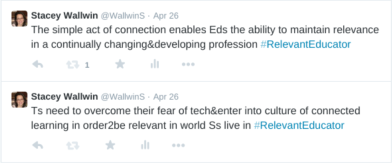I finished reading The Relevant Educator: How Connectedness Empowers Learning by Tom Whitby (@tomwhitby) and Steven W. Anderson (@web20classroom). This is the second book I have read in the Corwin Connected Educators Series.
I have tweeted what I thought were key points throughout:
Being a connected educator makes many professionals nervous. The idea of beginning to access digital resources and “putting yourself out there” can seem overwhelming for many. Non-connected educators are faced with many questions:
Where do you start to become connected?
Where do you find the time to learn?
How do you keep up?
What happens if I make a mistake?
This book easily informs educators on the various tools that will allow them to get started in “flattening their walls”, and connecting with their students on a whole new level. It gives a educators an understanding of the value of a #PLN and how to effectively establish one online.
Being a connected educator is much more than taking your students to the computer lab once a week to access technology. Relevant educators aren’t relevant because they use Twitter or Skype to engage their students. Relevant educators are relevant because they are open to modeling their learning, learning new skills to support their pedagogies, and they are open to new approaches to provide the best learning experiences they can for their students. Most importantly they are willing to access the global classroom to provide the most authentic, diverse learning experiences for their students.
Being a connected educator can reinvigorate your practice and help you find your passions in a virtual environment that is open, collaborative and most importantly, nurturing.
Our recent e-Learning Symposium in Northwestern Ontario (#SeLNO) and our Connected Leaders workshop with George Couros (@gcouros) provided educators in Northwestern Ontario the opportunity to learn from connected learners and most importantly become connected themselves. Their trepidation and eventual excitement was evident:
 Being connected requires a learning risk; however, the bigger risk is not changing our practices. Not challenging our mindsets. Not challenging our learning. By not becoming connected educators we perhaps run taking the biggest risk of all-not providing our students with the opportunity to meet the demands placed on them in a globally connected workplace.
Being connected requires a learning risk; however, the bigger risk is not changing our practices. Not challenging our mindsets. Not challenging our learning. By not becoming connected educators we perhaps run taking the biggest risk of all-not providing our students with the opportunity to meet the demands placed on them in a globally connected workplace.






